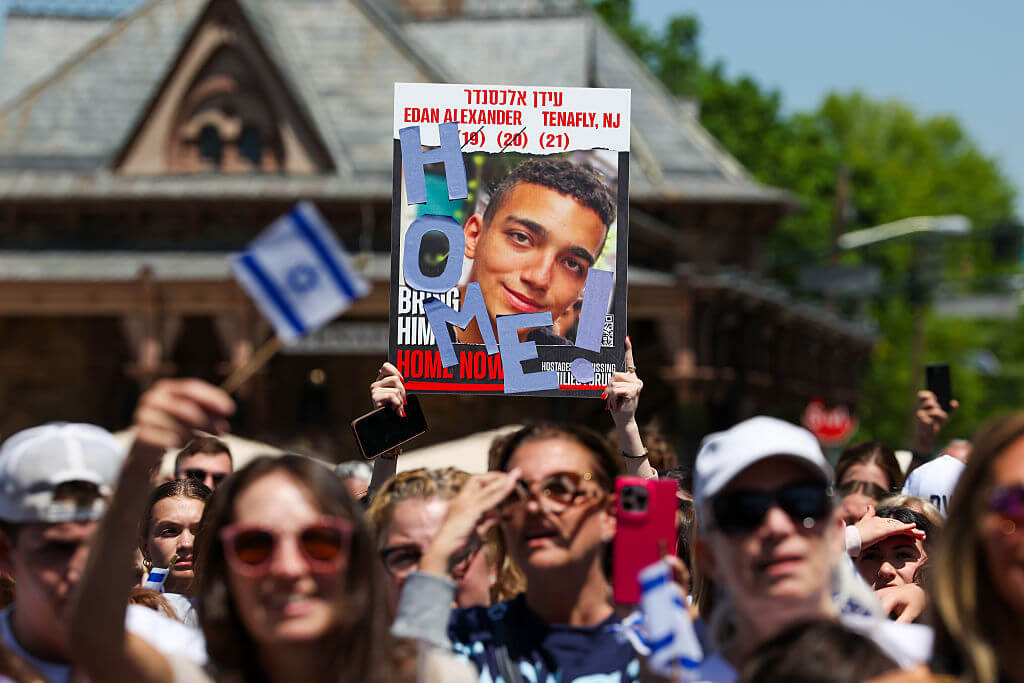Poland Remembers Shoah in New Ways

Don’t Forget: A woman participates in the March of the Living at Auschwitz. Grassroots Polish communities are coming up with new and innovative ways of remembering the Shoah. Image by getty images
(JTA) — Two very different events, hundreds of miles apart, demonstrated the wide range of ways in which the memory of Jews and the Holocaust are commemorated in Poland.
One was a simple grass-roots ceremony to dedicate a monument at the site of the destroyed Jewish cemetery in a small town called Rychwal, in central Poland.
The other was a high-level, international event marking the tenth anniversary of the dedication of the vast memorial at the site of the Nazi death camp at Belzec, on the Ukrainian border in southeast Poland, where about 500,000 Jews were murdered.
On June 23 in Rychwal, Poland’s chief rabbi, Michael Schudrich and another Warsaw rabbi joined local officials, including a priest, in cutting the ribbon on a big boulder set up as a memorial at the long-forgotten site of the cemetery, now an open field.
In addition, new signage recounting the history of Jewish in the town has been set up, and the perimeter of the cemetery has been marked with stones.
No Jews live in Rychwal today, but local activists had worked for years with town officials on the project.
“It’s very reassuring that these steps were taken by a community that is not the Jewish community, and they even did it from their own funds,” Rabbi Stanislaw Wojciechowicz told the Polish news agency PAP.
“It is something that we had to do,” activist Pawel Mazur said. “It was the right thing to do, the moral thing to do.”
Two days later, and 300 miles across the country, Schudrich joined the U.S. and Israeli ambassadors, Polish officials including a representative of the Culture Ministry, a Catholic bishop and a senior American Jewish Committee delegation to mark the 10th anniversary of the Belzec memorial.
Dedicated in 2004, the Belzec memorial was a joint project of the AJC and the Polish government and is one of the most powerful and devastating Holocaust commemorative sites.
The Nazis had obliterated all traces of the death camp, so Polish artists Andrzej Solyga, Zdzislaw Pidek and Marcin Roszcyk turned the entire area into a giant memorial sculpture.
The whole site is covered in slag, to resemble ashes, and a deep pathway cuts down to a memorial wall bearing the first names of Jews. Around the perimeter are twisted lengths of iron and the names of the scores of towns, mostly in southeast Poland and western Ukraine, whose Jews were killed there.
After the official ceremony, participants made their way down the path to light candles at the memorial wall.
“There are two things going on in Poland,” Schudrich, who chanted El Male Rachamim at both ceremonies, explained. “Some Poles are discovering that they have Jewish roots. But also Poles are rediscovering a Jewish presence and patrimony, both at the grassroots level and at the highest level of government.
“It’s happening again and again. The country is becoming a model of how to deal with lost memory, and to get it right.”
The Forward is free to read, but it isn’t free to produce

I hope you appreciated this article. Before you go, I’d like to ask you to please support the Forward.
Now more than ever, American Jews need independent news they can trust, with reporting driven by truth, not ideology. We serve you, not any ideological agenda.
At a time when other newsrooms are closing or cutting back, the Forward has removed its paywall and invested additional resources to report on the ground from Israel and around the U.S. on the impact of the war, rising antisemitism and polarized discourse.
This is a great time to support independent Jewish journalism you rely on. Make a gift today!
— Rachel Fishman Feddersen, Publisher and CEO
Support our mission to tell the Jewish story fully and fairly.
Most Popular
- 1

Fast Forward Ye debuts ‘Heil Hitler’ music video that includes a sample of a Hitler speech
- 2

Opinion It looks like Israel totally underestimated Trump
- 3

Culture Is Pope Leo Jewish? Ask his distant cousins — like me
- 4

Fast Forward Student suspended for ‘F— the Jews’ video defends himself on antisemitic podcast
In Case You Missed It
-

Fast Forward For the first time since Henry VIII created the role, a Jew will helm Hebrew studies at Cambridge
-

Fast Forward Argentine Supreme Court discovers over 80 boxes of forgotten Nazi documents
-

News In Edan Alexander’s hometown in New Jersey, months of fear and anguish give way to joy and relief
-

Fast Forward What’s next for suspended student who posted ‘F— the Jews’ video? An alt-right media tour
-
Shop the Forward Store
100% of profits support our journalism
Republish This Story
Please read before republishing
We’re happy to make this story available to republish for free, unless it originated with JTA, Haaretz or another publication (as indicated on the article) and as long as you follow our guidelines.
You must comply with the following:
- Credit the Forward
- Retain our pixel
- Preserve our canonical link in Google search
- Add a noindex tag in Google search
See our full guidelines for more information, and this guide for detail about canonical URLs.
To republish, copy the HTML by clicking on the yellow button to the right; it includes our tracking pixel, all paragraph styles and hyperlinks, the author byline and credit to the Forward. It does not include images; to avoid copyright violations, you must add them manually, following our guidelines. Please email us at [email protected], subject line “republish,” with any questions or to let us know what stories you’re picking up.












